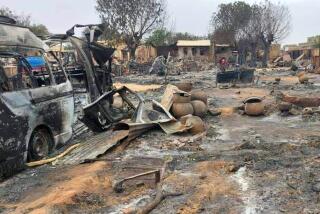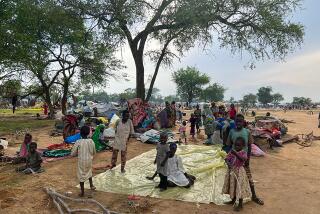Sudan’s Abyei region descends into chaos
Reporting from Khartoum, Sudan, and Cairo — Sudan’s disputed oil-rich central region spiraled further into chaos Monday, as armed looters set fire to the main town in the Abyei area, residents and humanitarian groups fled and northern troops dug in for what could be a prolonged conflict with southern forces.
The northern army appears to have sent thousands of troops to Abyei town, according to satellite images, although army officials denied the number was that high.
Thousands of those displaced by the fighting arrived in neighboring areas to the south, where schools were converted into shelters. Some took to the streets to protest what they called an “unjustified invasion” of Abyei by northern forces.
Tanks from northern Sudan began arriving in Abyei in recent days, confronting southern troops that had been patrolling the area as part of a joint security force. A U.N. compound was hit by mortar fire, and U.N. Secretary-General Ban Ki-moon and the Security Council called for an immediate end to the violence. Late Monday, the United Nations issued a statement condemning looting and burning in Abyei by armed men.
Southern Sudan is mainly animist and Christian, and its people are ethnically linked to sub-Saharan Africa. The north is mostly Muslim, and many residents consider themselves Arabs. The south voted in January to secede, and is scheduled to become independent July 9.
John Ajang was among those who fled on foot with his family ahead of the fighting. The Christian cattle herder walked two dozen miles south to the nearest town, Agok. It took him more than eight hours. He traveled Saturday with his two children on his back, sometimes carrying his sick wife as well.
Ajang, 41, feared that if he did not flee, he and his family would suffer the same fate as those who stayed put during clashes in 2008, when scores died.
“I saw on Friday over 45 tanks belonging to the northern army,” Ajang said. “They brought all their troops nearby from the oil fields because they want more oil.”
On Monday night, witnesses in Abyei town reported hearing gunfire and warplanes overhead. Northern army officials said the area was under their control. They did not say how many casualties they suffered in clashes with southern forces. The military hospital in Khartoum reportedly received dozens of wounded soldiers flown in from Abyei.
Many organizations active in Abyei evacuated staff and suspended operations over the weekend, including Doctors Without Borders.
“Nearly the entire population of Abyei town fled the city, which is now almost empty,” the humanitarian group said in a statement, adding that the group had shifted to Agok to provide treatment at mobile clinics to those displaced by the fighting.
Ajang, who fled with other men from the Dinka tribe, said he did not know of any residents killed or injured, since those he knew all fled Saturday after seeing northern troops bombard southern forces.
A 2005 peace agreement between the north and south that ended decades of civil war granted Abyei special status. A referendum was scheduled in January to determine which half of the country it would join, but the vote was delayed because of disputes over who was eligible to participate. Southern officials said the nomadic Misseriya tribe could not vote, but northern counterparts insisted that if it could not, there would be no referendum.
The Misseriya, a northern, Arab tribe, have laid claim to Abyei, as have Ajang’s southern Dinka tribespeople, fighting since large oil deposits were discovered during the last few decades. The tribes had previously lived together and intermarried for centuries.
U.N. Security Council envoys visiting Sudan, who earlier demanded that the north withdraw from Abyei, were expected to meet the southern government in the southern capital, Juba.
More than 100 people demonstrated in Juba before the meeting, chanting against the northern takeover of Abyei and against President Omar Hassan Ahmed Bashir.
Bashir, who is wanted by the International Criminal Court in connection with genocide in Sudan’s Darfur region, gave a speech Monday saying northern Sudan wanted to end the violence in Abyei.
“We are trying to solve the remaining issues and remove tensions in Abyei and pursue a peaceful solution for Abyei,” Bashir said.
Meanwhile, in Agok on Monday, Ajang and his family were worried about what had become of their home. They had fled Abyei so quickly, they had left nearly everything they owned behind. They sent someone back to check for damages.
“The messenger said the northern army has burnt everything, just ashes,” Ajang said. “This means don’t come back. How can we not go back to our land?”
Special correspondent Ahmed reported from Khartoum. Times staff writer Hennessy-Fiske reported from Cairo.
More to Read
Sign up for Essential California
The most important California stories and recommendations in your inbox every morning.
You may occasionally receive promotional content from the Los Angeles Times.











